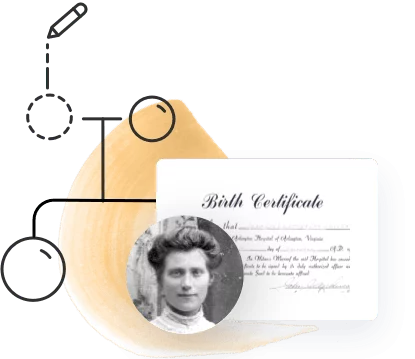
Most genealogy research projects start with birth, marriage, and death records. But there are many other kinds of records that can reveal valuable information — and one type you may have heard less about is legal documents and government records. These sources tell the stories of the past and shed light on the lives your ancestors lived. They are important, yet sometimes overlooked because they can be harder to find. Today, online search engines and databases make them easier to access.
Key notes about using legal documentation for genealogy research
- Start with local and then state records for specific searches
- The more documents you find, the easier it is to cross-reference data
- Some records include physical descriptions that bring history to living color
How to find legal and government records
It is easier to search locally because there are simply fewer records to explore. State-level government documentation is the next step. These historical records may exist across a range of departments, archives, and systems. Look for online resources that dive deep into all of them. Otherwise, contact county courthouses and town clerks to learn how to get access to public records. In small towns, these records may only be available on paper or microfilm. The state archives should have clear instructions and digitized collections.
Types of legal documents to search
Each record you find fills in a piece of the puzzle of who your ancestors were, where they came from, and what type of life they lived. You can confirm basic facts and learn some surprising details about less common things. This makes your genealogical research more vivid and meaningful: stories instead of simple dates and names.
Voter registration lists
Names, addresses, occupations, and political affiliations found here can lead you to new avenues of information. New registrations can help you track where family members moved throughout their lives. Find these in courthouse archives and online databases.
Passport applications
You may get interesting details from these applications including physical descriptions like eye and hair color. If you only have black and white photos of ancestors, this can make a big difference. They confirm citizenship, migration patterns, and even where the whole family liked to take vacations in some cases.
Naturalization and denization records
The earliest records may include little more than names, dates, and arrival ports, but ones in the 20th century provide more details. The records are especially useful if your ancestors anglicized or Americanized their names after moving to the new country. Denization records were often used in the UK in earlier centuries.
Prison and criminal records
Were any of your ancestors involved in criminal activity? You never know! These surprising assets to genealogical research span court documents, prison intake records, and arrest paperwork even if accusations never went any further. You may even get lucky and find a photograph of an ancestor who was incarcerated.
Name change petitions
There are many reasons why someone would want to change their name, but regardless of the reason, it’s more difficult to find and track people who changed their name through family trees and historical records. With name change petitions and approvals from local or state courthouses, you can fill in the gaps and make better connections to new branches you may not have known about before. Common data found here include addresses, occupations, marriage details, and reason for the name change.
Tax records and property assessments
Knowing where your relatives lived helps you map your ancestry in unique ways. Data about property taxes, sales and purchases, and similar things also gives insight into how wealthy they were or how their income and assets changed over time. Sudden changes in property ownership can point to deaths, job loss, and other hardships. Align these with events in the region or country to get a fuller picture of their life experiences.
Morgue and autopsy reports
Morgue and autopsy reports can give you deeper insight into how an ancestor’s life ended. This is especially true if there were any legal inquests, court orders, or related people that could send you down new avenues of discovery.
Take the time to dive deep into less common legal documents and government records to fill in the gaps in your genealogical research. Sometimes the smaller, more local paperwork provides the greatest insight and surprises.
MyHeritage allows you to explore millions of these government and legal documents with just a few clicks — helping you uncover stories, verify facts, and grow your family tree with confidence. Start exploring legal records and uncovering your family’s past with MyHeritage’s powerful research tools.
FAQ about using legal documents in genealogy
Who can you ask at a local level for help finding records?
County or town clerks are the main contact point for this type of research. They can point you toward the archives or give more information about how to access them.
What records can give hints of physical appearance?
Passport applications and morgue or autopsy reports can all include physical descriptions that may help you put a face to a name. Details like eye and hair color help bring black and white photos to life.
Can tax or land records confirm family relationships?
In some cases, yes. If they do not list family members directly, you may find these details when the property changes hands after a marriage or death and inheritance. This, combined with other documents, helps confirm data. Also, in the past, many extended families lived on the same large property or close by to each other.
How could you more easily discover unknown family members?
Your ancestors might not have wanted anyone to know about a relative who had legal issues or one who changed their name to disappear for one reason or another. With prison, court case, and name change documents, you can reveal whole new branches of the family tree and get more insight into past lives.
Where can you find records of someone who left the country?
Although immigration paperwork was quite extensive for much of more recent history, details about individuals leaving the country may not be as thoroughly documented. Even occasional trips, especially if they were repeated yearly, can give insight into family members in the old world. Passport applications come in handy in these circumstances. The national archives or online resources are your best bet.


